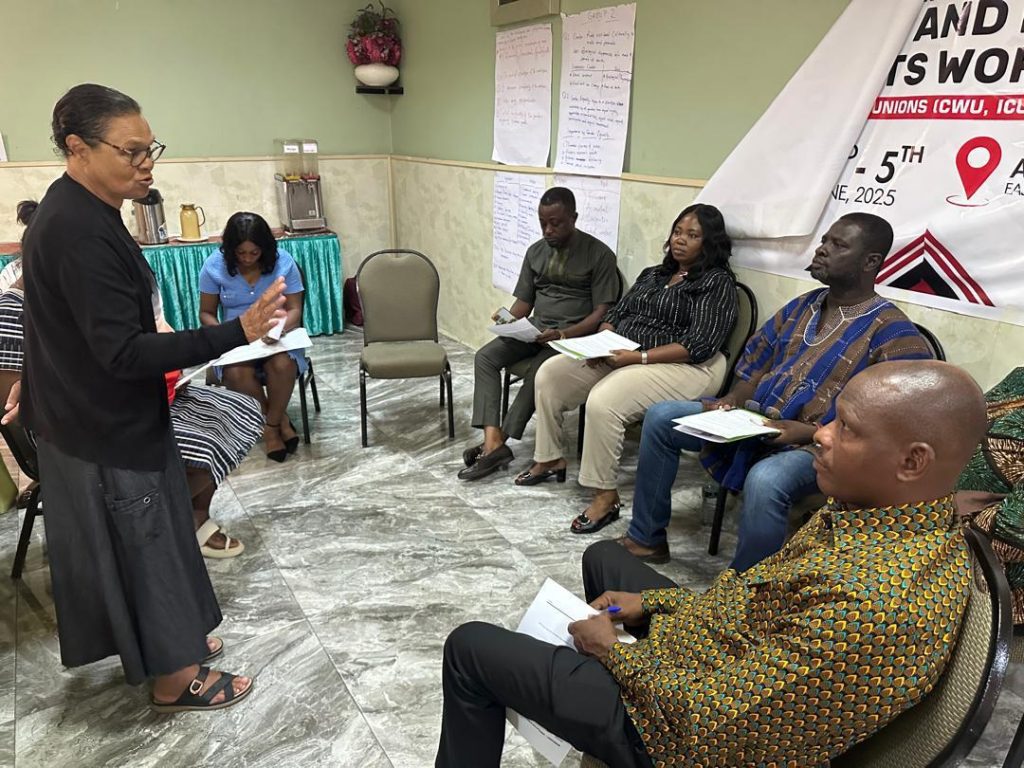Gender Equality in Collective Bargaining: A Shared Responsibility
Trade unions across Africa are increasingly being called upon to integrate gender struggles into their broader agendas, emphasizing that these issues are not isolated concerns of women alone but essential components for improving working conditions for all employees. This shift in focus is vital for dismantling patriarchal norms entrenched in workplaces and ensuring equitable treatment for both men and women.
Patricia Nyman, the Women’s President of UNI-Africa—a regional organization dedicated to promoting the welfare of service sector workers—has been at the forefront of this call to action. Speaking at a recent workshop in Accra on Gender Equality, Collective Bargaining, and Parental Rights, she emphasized that collective bargaining must adopt a “gendered perspective.” This approach involves integrating gender-related issues into negotiation frameworks, which not only benefit women but also enhance workplace conditions for men.
Nyman highlighted several key areas where gender considerations should be prioritized:
* Parental rights – Including paid maternity leave and paternity leave.
* Healthcare facilities – Especially those catering to pregnant women and offering breastfeeding breaks and infrastructure.
* Equal opportunities – In training, promotions, and access to benefits such as housing, medical aid, and long service allowances.
The workshop, organized by the Trades Union Solidarity Centre of Finland (UNI-SASK), brought together three Ghanaian unions—the Communication Workers Union of the Trades Union Congress (TUC), the Industrial and Commercial Workers Union, and the TUC Security Union—to enhance their negotiation skills and promote inclusive dialogue around gender equality.
Nyman pointed out a critical issue: women’s voices often go unheard in matters affecting them directly. This exclusion can significantly impact union recruitment efforts and the ability to organize new members effectively. She stressed that while collective bargaining remains a core responsibility of trade unions, gender issues are frequently sidelined or omitted from the agenda altogether. This oversight excludes a significant portion of union membership—women—from participating meaningfully in shaping their labor conditions.
To address this imbalance, Nyman proposed practical measures such as reserving seats for women at negotiation tables. This would empower women to articulate their needs and advocate for progress, particularly those with proven track records in enhancing conditions for female workers. “We recognize that women are the agents of their own liberation and must lead the gender struggle,” she asserted.
As the National Gender Coordinator of UNI-Africa, Nyman urged unions to commit to eliminating discrimination based on sex, gender, pregnancy, marital status, and employment status. Additionally, she encouraged unions to champion policies that support women’s career advancement while acknowledging their dual responsibilities in balancing work and family life.
Leocadie Bodjouo, UNI-Africa Regional Representative for Women, echoed Nyman’s sentiments, emphasizing the need to dismantle gender-based barriers both professionally and domestically. According to Bodjouo, achieving equality requires shared responsibility and a recognition that women’s rights are fundamentally union rights.
Participants at the workshop, including male unionists, pledged their collective support to advance women’s causes within the union framework. They encouraged female colleagues to seize available opportunities to contribute more effectively to stronger collective agreements. The discussions underscored that parental rights come with responsibilities, highlighting the importance of nurturing future generations responsibly.
This initiative is part of an ongoing SASK project aimed at building the capacity of unions in negotiation skills. Funded by Finnish unions, the project commenced in 2022 and is scheduled to continue until 2025. Its primary goal is to enhance the capabilities of UNI-Africa affiliates in Ghana, Kenya, and Zimbabwe, enabling them to fulfill their collective bargaining mandates more effectively.







